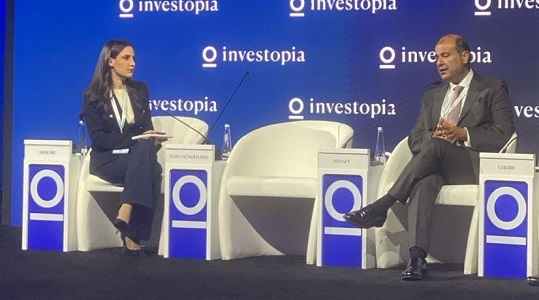Secretary-General of the Union of Arab Chambers, Dr. Khaled Hanafi, stressed during the second working session entitled: “The New Economy in the Region: Artificial Intelligence, Waste Management, and Food Security,” within the activities of the first session of the conference of businessmen and investors from Arab countries, Central Asian countries and Azerbaijan, which was held during the period 26-27 February, organized by the League of Arab States and the Ministry of Economy in the United Arab Emirates. In the presence of the Assistant Secretary-General and Head of the Economic Affairs Sector at the League of Arab States, His Excellency Dr. Ali bin Ibrahim Al-Maliki, and the Ministers of Economy, Trade and Investment from the Arab Republic of Egypt, the United Arab Emirates, Tunisia, Qatar, Mauritania, the Union of the Comoros, the Central Asian countries and Azerbaijan. “Today, we live in a world that is changing at an unprecedented speed, as economic transformations, environmental pressures, and demographic challenges have made it necessary to adopt a new economic model based on innovation and sustainability. In this context, artificial intelligence, waste management, and food security are not just separate sectors, but rather interconnected pillars that support each other in shaping a future economy capable of withstanding crises.”
Dr. Khaled Hanafi noted that, “According to PwC estimates, artificial intelligence is expected to add $15.7 trillion to the global economy by 2030, of which about $320 billion will be achieved in the Arab region, as the UAE seeks to become a global hub for artificial intelligence through the ‘UAE Artificial Intelligence Strategy 2031’. Saudi Arabia has also allocated more than $20 billion to invest in artificial intelligence by 2030 as part of “Vision 2030,” and Egypt is investing in artificial intelligence applications in government services, agriculture, and education.”
The Secretary-General called for "the importance of forecasting demand and improving supply chains, which increases production efficiency by 20-30 percent. Automating production processes will reduce operational costs by up to 40 percent. Banks' reliance on artificial intelligence technologies to assess credit risks and analyze financial data will help reduce financial fraud by 50 percent."
He noted that remote sensing and agricultural data analysis technologies could increase agricultural production by 25 percent and reduce water consumption by 40 percent. Calling for “investment in the circular economy, where Gulf countries can reduce solid waste by 50 percent by 2030 through recycling and converting waste into energy, as artificial intelligence can analyze waste data and improve collection and sorting methods, which increases the efficiency of recycling operations by 30-40 percent. For this reason, Arab governments need to provide tax incentives for companies that invest in recycling and alternative energy.”
Dr. Khaled Hanafi said, “Food security is the biggest challenge in the future, as Arab countries import 85 percent of their food needs, making them vulnerable to fluctuations in global markets. According to the FAO, 40 million people in the region suffer from severe food insecurity. From this perspective, vertical farming and soilless farming should be used to increase production by 50 percent and reduce water consumption by 90 percent. Smart irrigation systems that use artificial intelligence to analyze soil and water data should also be used, reducing water waste by 40 percent,” Explaining that “Blockchain technology can improve the tracking of agricultural products and ensure their quality. In addition, investing in smart logistics can reduce food waste by 20-30 percent, which requires funding innovations that reduce dependence on food imports and enhance self-sufficiency. The solution lies in cooperation between governments, the private sector, and research institutions to enhance innovation and sustainability.”
Source (Union of Arab Chambers)

